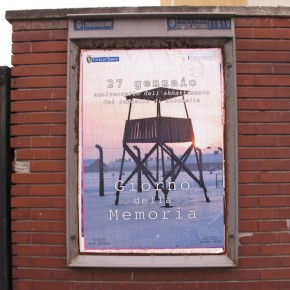At first, you don’t even notice the pattern. You wander the streets of this city, looking for subjects to photograph: a political poster here, a billboard there, and, down the block, an impressively tagged stretch of wall. But then you notice, like Oedipa Maas in Thomas Pynchon’s The Crying of Lot 49, when she starts seeing muted post horns everywhere, that one message cries out, over and over: “Bored.”
Your mind races through precedents: the subway cars you used to see in New York, before they made it a priority to keep them shiny, emblazoned with the signatures of the boldest and best spray-can masters; the high-concept words of artists like Jenny Holzer, neatly arrayed on a gallery wall or scrolling like a stock ticker along the side of a building; and, above all, the slogans of the Situationists and their leftist rivals, wheat-pasted all over a Paris in flames.
This particular message, however, is breathtaking in its simplicity, refusing to provide more information than is absolutely necessary.
The questions come fast and furious. Who could be responsible for a campaign like this? What are they bored with? Does this word communicate defeat — no end to the tedium — or serve, rather, as a declaration of victory, excitement conjured in the very act of expressing its antithesis? Or might the state of boredom itself stand for something positive?

The controversial German philosopher Martin Heidegger argued that being bored can actually be a way to get in tune with our being itself, the self-awareness that distinguishes us from other creatures. His best example, waiting for a train at a provincial station with nothing to occupy our minds other than the sheer fact of waiting, is easy for anyone who has experienced that sort of situation to identify with. But it also indicates a privilege of which most bearers are blissfully unaware.
Most of the world’s population is too busy with survival to experience this degree of boredom: it doesn’t divide us from other creatures so much as our fellow human beings. In a world where time is, in a sense, the most precious of commodities, a surfeit of unoccupied minutes is a luxury, even when those who possess it complain bitterly of their largesse.

From this perspective, the spread of this message across Berlin could be regarded as an unwitting testament to German arrogance, testifying to the surplus time that accrues in a nation to which much of Europe is deeply in debt. In Athens, young people might be angry; in Madrid, filled with despair; yet in Berlin, flush with an advantage they have the insouciance to repudiate.
Perhaps the people responsible for this campaign were engaging in a form of immanent critique, subtly calling out their fellow citizens for not appreciating their status as “haves” amid a rising tide of “have-nots.” Or maybe, though perceiving this problem, they had a different purpose in mind, one with a more abstract, international character.

One of the most famous Situationist slogans was targeted squarely at the “affluent society” of the 1960s: “In a society that has abolished all adventure, the only adventure left is to abolish that society.” Might the laconic reiteration of boredom be a twist on this formulation, an implicit call to arms for those people unwilling to pass the rest of their lives in a weary, disenchanted frame of mind?
Although the percentage of truly privileged individuals continues to shrink worldwide, reaching out to those of them who refuse to think only of themselves remains a political problem of great importance.
Revolution might no longer be possible in the all-at-once sense idealized in high modernity, but the hope for a more fitful, drawn-out transformation of the socio-economic order remains. It is abundantly clear, however, that even this more modest dream will only be realized with the help of the “class traitors” who reject the advantages that drain their lives of adventure.
That may be the most redemptive way to read this intriguing example of guerrilla art, as a demand, at once, to acknowledge your privilege, the luxury of experiencing boredom, and disavow it by engaging that free time with subversive praxis. Instead of impatiently waiting for our train to come, we can set our hearts and minds to the task of conceiving a new destination.
Commentary by Charlie Bertsch. Photographs courtesy of Joel Schalit.





